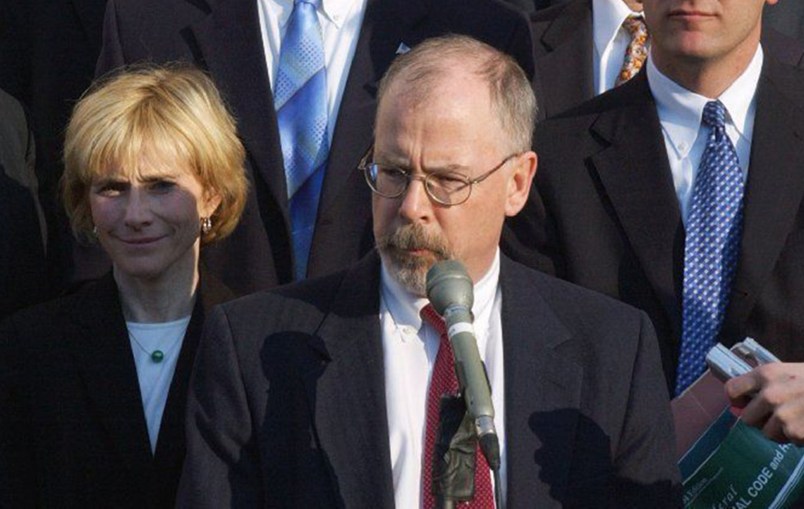A new filing suggests deep flaws in a key prosecution brought by the Bill Barr-appointed special prosecutor John Durham, who is charged with investigating the investigators of the Trump-Russia scandal.
The filing came from defense attorneys for Michael Sussmann, a former attorney for a law firm known for representing the DNC, and which represented the Clinton campaign in 2016.
Sussmann faces a single count of making false statements in a case brought by Durham in September 2021. Durham alleged that Sussmann misled the FBI about his client.
It was an odd case from the beginning, and one that’s gotten even stranger. Defense attorneys for Sussman now say that they have received evidence that the single witness for the false statements claim — a former FBI general counsel — gave conflicting accounts in other Justice Department interviews.
The upshot? There may be evidence to suggest that the case’s star witness has a faulty memory of the alleged lie that the prosecution wants to prove took place.
“It makes the defense’s case for them,” Randall Eliason, a former D.C. federal prosecutor and GW Law lecturer, told TPM. “How do you go to a jury, ask them ‘find out precisely what Sussmann said,’ when your only witness to what he said has given a different version of what he said?”
Sussman’s case goes back to the 2016 presidential campaign and questions of Russian interference.
Perkins Coie, the law firm at which Sussmann was employed, was continuing its longstanding and well-known relationship with the Democratic Party that year and, among other clients, was representing the DNC.
At the same time, the FBI had begun to investigate ties between the Trump campaign and the Russian government, and Moscow was waging a campaign to interfere in the 2016 election. That effort would dominate American politics for the next two years, with Trump’s then-campaign manager Paul Manafort going to prison for charges emanating from the investigation.
But in September 2016, the details of what was taking place remained unclear. In that month, Sussmann met with FBI general counsel James Baker, offering him information: internet researchers had found evidence of a comms link between Russia’s Alfa Bank and the Trump Org.
At the time, it was an explosive allegation. The theory has since been called into question, and the underlying data remains a mystery.
Durham makes an allegation broadly in line with Trump’s attacks on the Trump-Russia inquiries: that Democratic operatives orchestrated the scandal.
Days before the five-year statute of limitations expired, Durham secured a grand jury indictment against Sussmann, charging him with concealing from Baker that he was giving him the information on behalf of a client during the September 2016 meeting.
The indictment charges the following:
Specifically, SUSSMANN stated falsely that he was not doing his work on the aforementioned allegations “for any client,” which led the FBI General Counsel to understand that SUSSMANN was acting as a good citizen merely passing along information, not as a paid advocate or political operative.
In the indictment, Durham cited notes taken by then-assistant director of the FBI Counterintelligence Division Bill Priestap, to whom Baker recounted the conversation during a phone call after the meeting.
There’s a problem, however.
The new filing suggests that Baker provided conflicting accounts of the meeting. Sussman’s lawyers attached two separate DOJ documents in which Baker appears to offer differing descriptions of what took place.
Specifically, in a July 2019 interview with the DOJ inspector general, Baker contradicted the crux of the indictment: he said that Sussmann informed him that he was working on behalf of a client.
“So Michael came in and met with me [a]nd he had some amount of information . . . that he said related to strange interactions that some number of people that were his clients, who were, he described as I recall it, sort of cyber-security experts, had found…”
In the other, a memorandum of a June 2020 meeting that Baker had with Durham’s office, the former FBI general counsel said that the meeting lasted a maximum of 20 minutes, and that he did not inquire as to whether Baker was there on behalf of a client.
Taken together, the two documents suggest that, over the past five years, Baker’s recollection of details of the meeting has diverged.
They also may undermine the core argument of the indictment: that Sussman said he was giving the information “not for any client.”
Discovery is still being released in the case, but the filing suggests that the special prosecutor had multiple separate accounts available to him.
“I think that suggests that this prosecution was fatally flawed from the start, and raises the question of why they were so eager to charge it,” Barb McQuade, a former U.S. Attorney for the Eastern District of Michigan, told TPM.
McQuade added that Baker’s conflicting accounts cast doubt on how useful he might be on the witness stand at Sussman’s trial.
“You have to prove that he made a false statement — I don’t know that he can prove [Sussmann] made any statement,” she added.
The filing came as part of an effort by Sussmann’s attorneys to hold the trial earlier than the Durham prosecutors want, and as they asked for the government to hand over more evidence in the case.







“Only the best corrupt lawyers…”
I don’t know a single lawyer who read that whole indictment and didn’t think it as substantial yet as stinky as a fart.
Granted, I don’t know any wingnut lawyers anymore.
The prosecution is the punishment.
The only remaining question is how long Garland is going to let Durham waste DOJ time and resources on fatally flawed prosecutions.
Was a grand jury ever involved in this indictment?